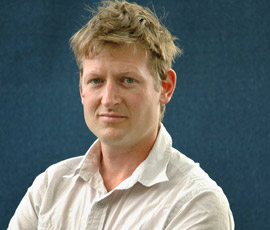Mark Lynas: Farmers should be free to grow GMs

Environmental campaigner and award-winning author Mark Lynas has called for farmers to be free to choose what kind of technologies they want to adopt and demanded anti-GM protestors stop hijacking future food production.
In a passionate and courageous speech at the Oxford Farming Conference, Mr Lynas admitted that after studying the science he had completely changed his position on GM, from being a sceptic to favouring it.
He claimed “there is rock solid scientific consensus around the world backed by science academies” in support of GM yet this is ignored because it conflicts with the vested interests of non-governmental organisations (NGOs).
“The GM debate is finished,” he said. “We don’t need to continue to discuss it. You are more likely to get hit by an asteroid than to get hurt by GM food.”
Mr Lynas believes agriculture has reached a crunch point and desperately needs to take on GM technologies in order to feed 9.5bn by 2050 on the same land area as today with less resource and a changing climate.
“The GM debate is finished. We don’t need to continue to discuss it. You are more likely to get hit by an asteroid than to get hurt by GM food.”
Mark Lynas
While he respects many NGOs, Mr Lynas said he felt the world had moved on and many so-called environmental groups had backed themselves into a corner with their negative GM arguments.
“I think we need a major dose of international myth busting and international deregulation. People have got their sense of risk back to front,” he said.
He was saddened by Greenpeace’s actions in Australia last year in destroying a GM wheat crop and by the Irish Green Party’s legal fight against blight resistant potato trials.
There was also criticism of the organic movement describing it as “rejectionist at heart” and he likened it to the Amish community in Pennsylvania, which avoids using modern technology.
Mr Lynas said use of modern technology did not equal more risk and that it was irrational to suggest that it was better for the environment not to use artificial chemicals.
The author’s work includes the books Six Degrees and The God Species: How the Planet Can Survive the Age of Humans.
Responding to the speech, Tom Macmillan, innovation director at the Soil Association, said Mark Lynas was right that improving productivity across agriculture, including in organic farming, had an important part to play in feeding the world sustainably.
However, he insisted that “banging on about GM crops” was a red herring.
“Farmers and the public have been promised the earth on GM yet the results to date have been poor,” he said,
“The UK government’s own farm scale experiment showed that overall the GM crops were worse for British wildlife. US Government figures show pesticide use has increased since GM crops have been grown there because superweeds and resistant insects have multiplied. Lynas, Paterson and other GM enthusiasts must beware of opening floodgates to real problems like this.”
Read the latest news on GM crops
Read more fron the Oxford Farming Conference

